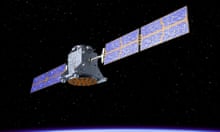What is Galileo?
Galileo is an £8bn satellite navigation system intended to rival the US-controlled Global Positioning System. Once fully operational in 2020 it will provide accurate position, navigation and timing information to be used by governments, citizens and industry. It will be used by everything from smartphones to security-critical military applications in target acquisition and tracking. The UK is developing receivers for military platforms that will incorporate Galileo’s encrypted Public Regulated Service (PRS).
What is the problem?
The European commission has started to block Britain’s space industry from being involved in manufacturing of the security elements of the satellite programme. The EU says the agreement struck over the terms of the 21-month transition period after Brexit gives it the freedom to do so. The commission has suggested that after Brexit the UK should not be given privileged access to “need-to-know” information about Galileo’s PRS. It has already banned UK representatives from discussions and exchanges pertaining to the post-2019 development of the security aspects of the satellite system.
What has been the UK’s response?
The government is furious. It claims UK entities have played an “integral part in designing, developing and managing Galileo to date, particularly the delivery of payloads for satellites, the ground control segment and the development of the PRS software.” The UK contributes to Galileo’s coverage through hosting two sensor stations at secure locations in the south Atlantic. The government claims that blocking UK industry from security-related areas risks causing delays of up to three years and additional costs of up to €1bn (£875m). Without being fully informed about the workings of the PRS, it claims, it would not have the assurances it needs to use the service in a military capacity. The UK has said it will demand the return of financial contributions to the programme of more than €1bn. The chancellor, Philip Hammond, has threatened to launch a rival satellite, possibly with Australia, if the EU does not back down.
How has the EU responded?
The EU has said it will not negotiate under threat. It insists the UK agreed with the rules when they were made. However, there are differences of opinion among the member states. The rough handling of the issue by the commission, including a failure to respond to an early letter expressing the concerns of the UK’s ambassador to the EU, Tim Barrow, has not pleased some diplomats in Brussels. The European commission is set to consult with the member states in the next few weeks. France, Spain, the Netherlands and the Baltic states are among those said to be keen for a resolution of the problem that will maintain the closest possible security links with the UK after Brexit.








